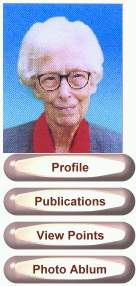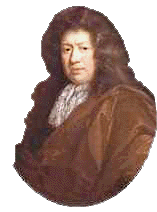

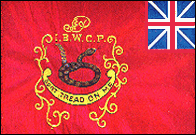

Breakfast with the ever-shapely Administrative Officer Winky Ip in the slightly dusty, Formica-lined magnificence that is Yuet Yuen Restaurant. I look her straight in the eyes and make a profound confession. “You know, Winky, I really feel I owe you, and all your hard-working colleagues in the civil service, a sincere apology.” She looks at me impassively, as if to say ‘probably – go on’. I take a deep breath and shift my weight awkwardly. It’s not every day I need to take back something I said, concede that I am in error or say ‘sorry’. In fact, it’s extremely rare. This is probably the first time since… 1982?
“Well, you know I was criticizing Hong Kong civil servants. I was mocking them for thinking that every social or environmental evil can be solved with a publicity campaign.” Winky starts to blurt out something along the lines of how they can, but stops herself. “I was making fun of you,” I continue. “You know – saying how you always assume a ‘public education’ exercise is the answer to every challenge, as if the dimwittedness of the masses is the problem and enlightenment from our caring bureaucrats the solution.” She eyes me suspiciously.
“In particular, I was ridiculing your response to all these accidents we keep seeing. You know, people keep walking under reversing trucks, their bodies get mangled up around the axles, so goods deliveries get delayed and our economy suffers. I was laughing at you because you thought putting absurd stickers on parking meters would sort everything out. I didn’t realize you were also going to take decisive action. It never occurred to me that you would roll up your sleeves, bang people’s heads together and produce a voluntary charter, with no legal or other penalties, that drivers can sign and pledge to ‘reverse with great care’. I mean – that’s it, isn’t it? Problem solved. No more road deaths! I didn’t believe you had that sort of resolve. I’m sorry.”
Winky relaxes and starts to look slightly smug. “Well, you know now,” she murmurs.

Self-Fulfilling Prophecy of the Year Award must go to shareholder rights campaigner David Webb, whose annual stock pick, Sino Golf, leapt 37 percent yesterday after he forecast it would do well in 2007. The real test, he points out, is how it performs over one year – beyond the endurance of his day-to-day market-moving power. Still, it is a useful knack to have. If I announce to the world that my pick for next year is Solomon Systech, will it take off the same way? No. Not least because it is a ludicrous gamble, albeit probably with limited downside, based on little more than wishful thinking, crossed fingers and a complete lack of serious analysis. The designer of the chips that run mobile phone displays has a share price right now of HK$1.24 (compared with just under HK$4 earlier this year), a P/E ratio of 5.17 and a yield of 13.9 percent. There is a reason for this apparent undervaluation – interim profit plunged by 50 percent, and anyone with half a brain won’t touch the stock. It is a cyclical industry with so-so prospects right now, the company is dependent on too few big customers, it has stiff competition and outdated products, and – worst sign of of all – the Singapore Government Investment Corporation has seen fit to buy a holding. On the bright side, it is financially strong and the people who run it don’t appear to be totally deranged maniacs. They might, conceivably, pull off a miracle. A good investment for people who would otherwise put the money on the horses.
Wed, 6 Dec
By scrapping the proposed Goods and Services Tax, Henry pleases everyone in Hong Kong except that group of unethical parasitic scumbags known as accountants, who would have profited handsomely from the misery of hard-pressed businesses trying to calculate how much of this onerous new levy they would have to pay. Now, 7 million relieved citizens smile good-naturedly at Henry and share his happiness in beating away this demon. But the more churlish among us have to ask him a serious question. Who was the moron who managed to put together a consultation document on tax reform that totally neglected the revenues the Government pulls in from land sales and land premiums? As a result of this omission, the entire analysis had zero integrity.
When a GST was proposed back in the late 1990s, the Government was running a huge deficit, partly because it had suspended land sales in the charmingly simple belief that the formula ‘strong economy leads to high property prices’ could be made to work in reverse. At some stage, the need to replace land-based revenues was forgotten, and we were told the GST would instead be used to offset cuts in salaries tax, which are paid only by the wealthy, thus making the GST a straight subsidy of the rich by the poor.
Being comfortably provided for myself, I naturally thought this was an excellent idea, made all the better by the prospect of a GST driving away the hordes of tourists who infest our streets. Being intellectually rigorous, however, a question nagged me. The land revenue is in effect a broad-based tax, ultimately paid by unknowing consumers, so do we really need a GST as well? The Government, by leaving land revenue out of its calculation, offered no answer.

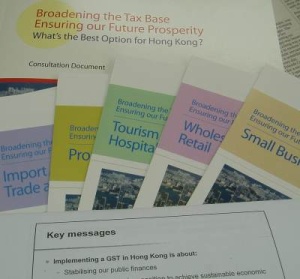
Thurs, 7 Dec
Former Secretary for Security Regina Ip’s MA dissertation Hong Kong – a Case Study in Democratic Development in Transitional Societies has been sitting on my desk since, if I remember rightly, September. During those sweltering summer days, I imagined myself reading the treatise one afternoon while sitting outside a Lan Kwai Fong hostelry, sipping an ice-cold beer and watching the world go by. A couple of months later, and I envisaged taking it along to one of the autumnal Peak barbecues hosted by fragrant socialite and gallery owner Rosabelle Lam, where I could use it to break the ice with other guests and fan the glowing charcoal. Now, as winter approaches, I expect I will curl up one night in my warm bed with the thesis, which will keep me avidly awake until a late hour or lull me into an early slumber, as the case may be.
Flicking through the pages towards the end, where I expect to find the excitement and action, I find a Regina gem…

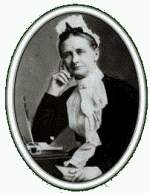
The poor man at his gate,
He made them, high or lowly,
And ordered their estate.
Fri, 8 Dec
Dawn outside IFC Mall, and a piercing scream echoes across Exchange Square. Clutching my Pacific Coffee paper cup of hot, brown, water-flavoured liquid, I stroll over past Elizabeth Frink’s water buffalo, Alf and Bonzo, and find a young man tied and stretched out on a bench normally occupied by hungry office workers enjoying delectable, 800-calorie Triple O White Spot hamburgers. Wild American friend Odell stands over him. As I approach, I see the ex-Mormon forcing a wedge of organic pineapple and vanilla cheesecake into his victim’s mouth. The muffled pleas for mercy make no impression on the ex-Mormon. “Make it easy on yourself buddy! Confess!” The young man suddenly stops struggling and whimpers for mercy.
“OK OK!” he stutters. I admit it. I’m the guy who designed Elsie Tu’s website.”
Odell unties the poor wretch and lets him run off. I tell him that, by coincidence, I have just finished reading Colonial Hong Kong in the Eyes of Elsie Tu. It’s a fascinating autobiography. Born Elsie Hume in 1913 in Newcastle, England, she married and worked as a missionary in China. In 1951 she came to Hong Kong, where she had some sort of falling out with her husband and other church colleagues. She and her future husband set up a basic school in a shanty town. The poverty and corruption led her to become a social activist, regarded with great suspicion by the colonial authorities, though she gradually became respectable enough to do her work from within the establishment. Her experiences in pushing social reform in post-war Hong Kong are good reading. But it’s towards the end of the book that the story starts to get weird. Chris Patten triggered an ancient chip on her shoulder, and she became a bitter opponent of democratic reform, a member of the pro-Beijing camp who denounced western political ideals, structures and politicians with all the certainty and vehemence of a 1960s or 70s radical socialist student. This made her a vitriolic and unapologetic critic of many of her fellow campaigners for social justice. Her passion for the underprivileged and hatred of bad government suddenly became a passion for the communist party and a hatred for anyone who thought Hong Kong would be run better if its government could claim a popular mandate. The old girl flipped.
Odell listens to all this with interest. “Yeah,” he concludes. “Hope it doesn’t happen to me when I’m in my 90s. I mean, Jeez, to end up with a website that sucks like that...”
